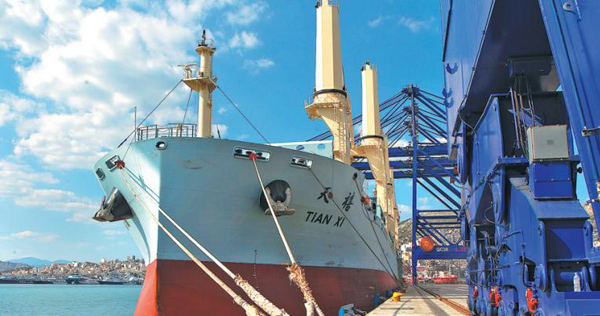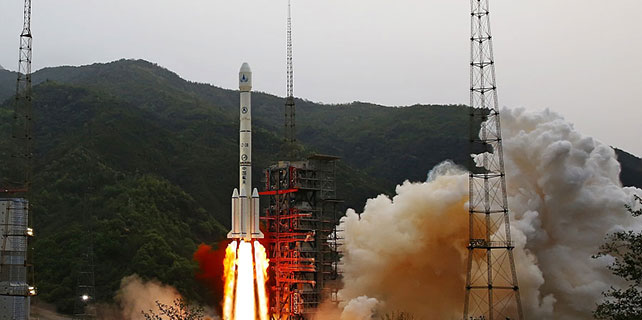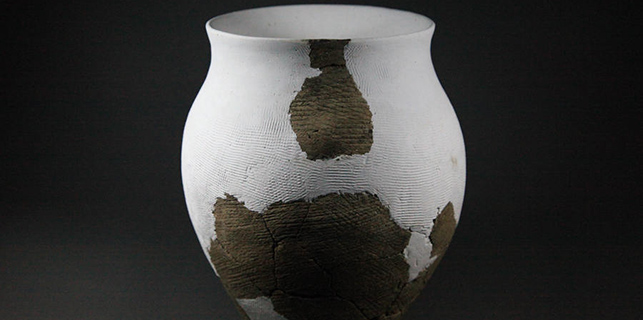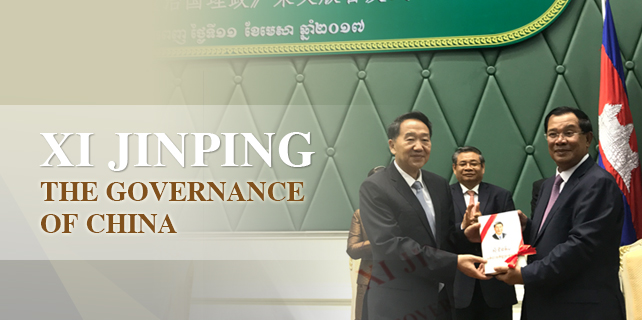Global connect
 |
|
A ship from China rests at Pireaus port, in Greece, last month. China COSCO Shipping Corp became the major shareholder and operator of the port in August. The project is seen as an example of strategic cooperation between the two countries. It is described in Belt and Road Initiative blueprints. [Photo/Xinhua] |
One month and counting.
More than 20 heads of state and government, as well as 1,200 delegates from countries around the world will descend on Beijing for the Belt and Road Forum for International Cooperation, which will be held on May 14 and 15.
It's a landmark event for the Chinese initiative, launched by President Xi Jinping in 2013.
Since then, the initiative-which consists of the Silk Road Economic Belt and the 21st Century Maritime Silk Road-has resulted in cooperative agreements with China from more than 40 countries and international organizations, and Chinese companies have invested some $50 billion in mainly infrastructure projects.
One of the aims of the forum is to move the concept from being a China-led initiative involving bilateral agreements to a multilateral concept that will help foster greater global connectivity.
Xi made his ambitions for the Belt and Road Initiative clear at the World Economic Forum in Davos, Switzerland, in January, when he defended globalization and called for countries to work together to tackle the world's many uncertainties.
"We should join hands and rise to the challenge," he said. "History is created by the brave. Let us boost confidence, take action and march arm-in-arm toward a bright future."
The main tangible elements of the initiative so far are the Silk Road Fund, for which the Chinese government pledged $40 billion in 2014 for investment in countries along the routes, and also the Asian Infrastructure Investment Bank, whose founding members include many Western countries, including the UK, France and Germany, along with leading Asian countries such as India, Pakistan and Vietnam.
Hugh White, a professor of strategic studies at Australian National University who was an adviser to former Australian prime minister Bob Hawke, believes the forum will be about making clear that the initiative is for everyone, not just China.
"For it to work, it has got to be something that has wider ownership and acceptance than just being a Beijing initiative," he said.
"It has the potential to be something very significant. The countries participating will be involved in creating a vision and framework for globalization for the next few decades. So it is of immense significance."
Joint development
Tom Miller, senior Asia analyst at Gavekal Research and the author of a new book, China's Asian Dream: Empire Building Along the New Silk Road, agrees the aim will be to make clear that the initiative is very much about joint development.
"The mistake you can make about the Belt and Road Initiative is to think it is purely a Chinese project," he said. "It can't be just that, because whatever China is doing, it is doing with enterprises in other countries. So it has to be about joint development."
Edward Tse, founder and CEO of management consultancy Gao Feng Advisory, believes the Belt and Road is still at the formative stage, and the forum will include a progress review and provide a forward vision.
"It is critical for the whole initiative. These leaders are coming together to discuss where to go next. Belt and Road started off as a concept, but the concept changed very quickly into some very tangible ideas like the AIIB and the Silk Road Fund and some very real infrastructure projects," he said.
"We don't have 100 percent clarity as to what it is or will evolve into; on the other hand, the participants have a lot of aligned interests and will want to be part of it."
Some critics of the initiative have seen it as China trying to exert greater geopolitical influence.
Shen Dingli, professor of international relations and executive dean of the Institute of International Studies at Fudan University, rejects this notion.
"We have no geopolitical agenda. It is not a strategy. At first it was bilateral, but it can also be China working with two or more countries, and it can also include projects in which China is not involved at all," he said.
"If they want to be involved, Japan can also bid for projects and be part of it. It is a global interconnectivity initiative. China does not have to be involved at all, but it is the country that initiated it, that's all."
Not a Chinese tool
Shi Yinhong, director of the Center for American Studies at Renmin University of China and one of China's leading foreign policy experts, says it would simply not work if it was seen as a Chinese geopolitical tool.
"If it was just about China's geopolitical interests, then other members would become suspicious and have their own concerns," he says.
"It is certainly not the message that China wants to put across. China, of course, does have many geopolitical interests, but it sees them as entirely separate from this initiative."
With the new administration in the United States having a protectionist agenda, the Belt and Road does reaffirm China's commitment to a new form of globalization based on connectivity.
Sun Yongfu, former director-general of the European Department of the Chinese Ministry of Commerce, believes this will be one of the strongest messages from the forum.
"I believe the Chinese government would like to use this platform to send a strong message that China supports globalization," he said.
"China is open to different ideas. It does not just want to put its own ideas forward, but also wants to listen to others. It is about what countries can do in cooperation with each other, jointly, bilaterally and multilaterally."
Wang Huiyao, president and founder of the Center for China and Globalization, China's largest independent think tank, said the forum offers the opportunity for some form of restatement of the importance of globalization.
"It could prove to be the new driving force behind globalization and provide the necessary impetus to stimulate the global economy and provide economic growth for the future. It has been three years since it was first proposed, and now is the right time to get to the nitty-gritty."
One of the benefits to China of the Belt and Road Initiative might also be to provide new export markets for its heavy industries that supply the construction sector, now that the domestic economy is slowing down.
"In that way it is a business initiative," said Shen at Fudan Universty. "Selling cement, iron and steel and overcapacity that we don't need at home. People are losing jobs in China and it is a way for them to continue to be employed."
Tse, also author of China's Disrupters: How Alibaba, Xiaomi, Tencent, and Other Companies Are Changing the Rules of Business, thinks this is overplayed.
"There is a lot of business involved, but to equate the Belt and Road Initiative as a way for China to export its overcapacity does not make sense economically. You can't really export products like cement. You cannot realistically transport it from Northeast China to Eastern Europe, as just one example. It is a very local business."
Peter Frankopan, director of the Centre for Byzantine Research at Oxford University and author of the best-selling book The Silk Roads, said the initiative has created major interest in the countries that were along the ancient Silk Road.
"Pakistan, Saudi Arabia, Russia and the Central Asian republics have all started to think about their economic futures in terms of these connections," he said.
"The reason there is so much excitement about these routes is that they have existed before. You only have to look back in history to see how all these connections and pathways were made.
"If they have existed before, it can work again. It will lead to a greater level of ease of distributing goods and services along the routes, which will make the whole process cheaper and quicker."
Vision recognized
Rana Mitter, director of the Dickson Poon China Centre at Oxford University, believes many in Europe now see the potential of these new connections.
"If you look at southern Europe and look at the way Chinese investment in Greece, Bulgaria and Romania is rocketing up, these could be more organically connected by this new initiative. I also think Turkey is important in all of this," he said.
The China historian and author of China's War with Japan, 1937-1945: The Struggle for Survival, however, believes there is so far less understanding of the potential benefits in Western Europe.
"If we are talking of the Chancellery in Berlin or the presidential palace in Paris, where there is the distraction of the French election, I think this is the case. There is a certain amount of interest in Brexit Britain about the potential opportunities," Mitter said.
Tse believes the Belt and Road offers a real opportunity for the UK after it leaves the European Union.
"The UK will gravitate more toward China, as its relationship with Europe is uncertain. From the Chinese investor standpoint there are a lot of potential deals to be made in the UK. With the lower level of the pound, a lot of potential targets are looking pretty reasonable right now," Tse said.
Sun, the former Ministry of Commerce European department head, believes many who have signed cooperation agreements will be looking for ideas about their own economic development at the Beijing forum.
"China initially learned a lot from the developed world in terms of technology, setting up special economic zones in the late 1970s and being open to ideas," he said. "It now has 34 years of experience to share with others."
- Belt and Road initiative provides strong support for UN 2030 goals
- China's Belt and Road Initiative ushers in 'Globalization 2.0': Experts
- Belt and Road 'huge opportunity' for China, world: Experts
- China's Belt and Road Initiative can contribute to global development agenda: UN
- Education ministry signs MoU on Belt and Road Initiative
















